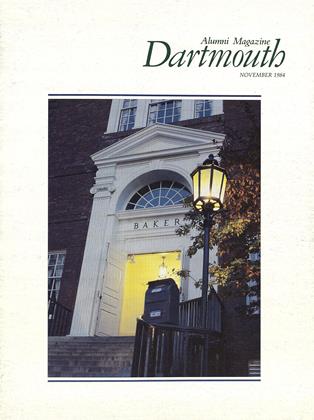It is noon on Tuesday, September 25. A blow has been dealt to the hometown forces. More than a century has passed since so much territory was last yielded to the challengers. The figures "55" and "24" hang with painful clarity in the air.
It is the Tuesday following the first football game of the season, a devastating loss to a powerhouse Penn. The setting is the weekly "Quarterback Luncheon" in Alumni Hall, a social event for Big Green partisans.
The affair is a luncheon, but the diners do not merely come to eat. It is an hour of tradition at which the preceding Saturday's gridiron competition is recounted in word and film, is discussed by expert coaches and players, is analyzed by listeners who hang on every word. The majority of the diners are older ladies and gentlemen men of Dartmouth and their wives as well as a few alumni of other Ivy League colleges. At the twelfth gong from Baker Tower, they seat themselves at one of a score of round, white-clothed tables and begin to eat, chatting quietly the while. Many introduce themselves to one or two of the players, grasp their arms warmly, smile generously, and share football talk. The veterans of dozens and dozens of seasons, perhaps mentally rerunning their own break for a long gainer long ago, have only enthusiastic encouragement for those with but a few seasons under their belts.
Soon the leader of the Dartmouth forces rises, moves to the podium, and begins to speak. His talk is a mix of modest praise for his young men, of detailed discussion of the game, and of promises for improved performance in the next contest.
The variable in his message is the outcome of the game. Was it a win or a loss? A win would be cause for celebration, for transformation of the sandwiches into a triumphal feast. But this is a loss. The sandwiches are the same, but the talk is full of reassurances rather than encomiums. There is an explication of mistakes, carefully balanced with hopeful signs for the future. The opposition is given credit where it's due. The home forces assume blame where that's necessary, but any blame is dispersed widely. Silver linings are sewn into the clouds. The tone is positive.
The faithful diners attend the coach's words with awesome scrutiny. They listen carefully, attempting to understand how their fine forces could possibly have fallen. Intricate explanations are set forth. Why is a punt kicked across the field a dangerous mistake?
In the end, reassurance is received, credit is bestowed, blame is dispersed. The fabric of the institution remains firm.
The diners fold their soiled napkins as the last shadowy film clip fades from the screen. They push back their chairs and walk from the darkened hall. They had come to receive assurance that the old traditions will not fail, and they leave sated.
 View Full Issue
View Full Issue
More From This Issue
-
 Feature
FeatureThe Draft: To Register or Not to Register
November 1984 By James Heffernan -
 Feature
FeatureLife After the Presidency
November 1984 By Shelby Grantham -
 Feature
FeatureHamming It Up
November 1984 By Gay E. Milius, Jr. '33 and Dick Dorrance '36 -
 Feature
FeatureGet a Job
November 1984 By Nancy Wasserman '77 -
 Feature
FeaturePractice, practice, practice
November 1984 -
 Books
BooksSo Much More
November 1984 By Peter Smith







